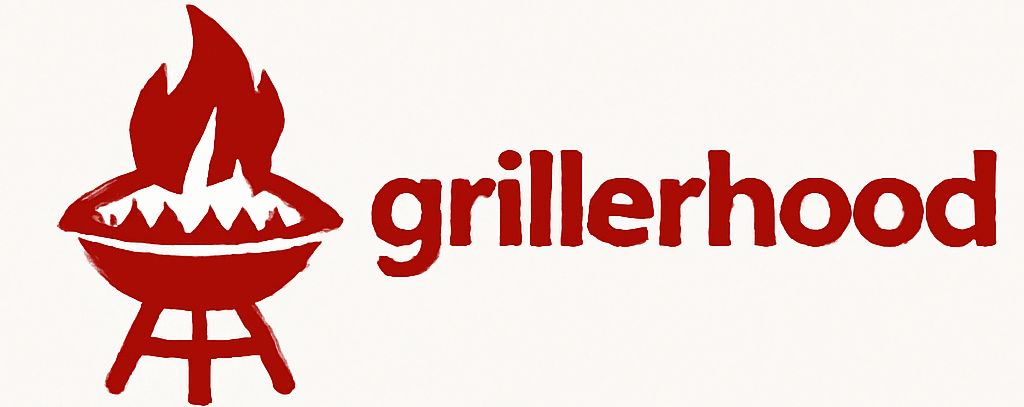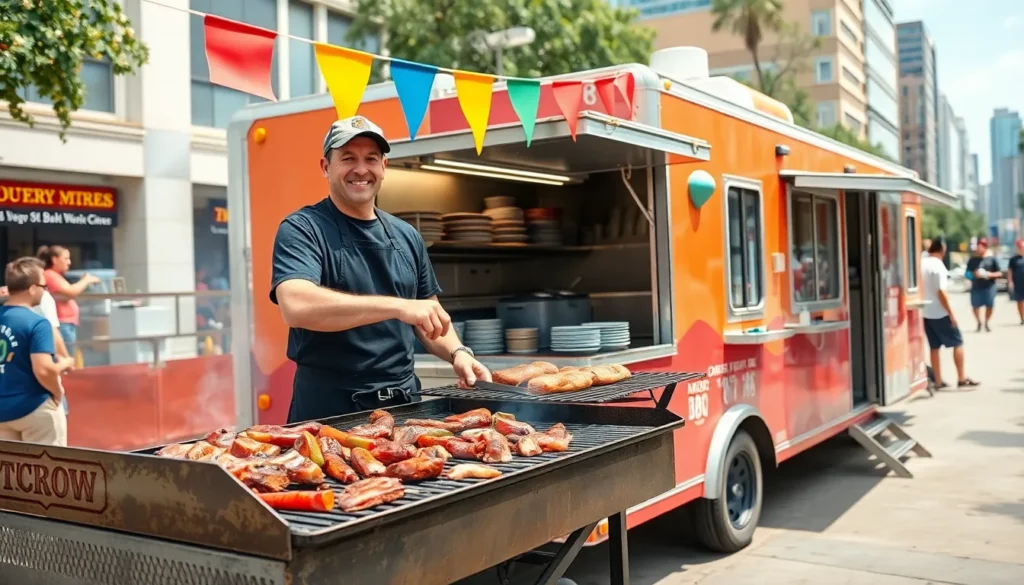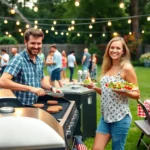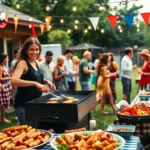The mobile food industry is booming and BBQ trailers represent one of the most profitable segments in this space. We’ve seen countless entrepreneurs transform simple trailers into thriving businesses that serve mouthwatering smoked meats to hungry customers across the country.
Starting a BBQ food truck business offers incredible flexibility and lower overhead costs compared to traditional brick-and-mortar restaurants. Whether you’re dreaming of weekend farmers markets or catering large events, the right trailer setup can make all the difference in your success.
We’ll explore creative BBQ trailer ideas that maximize space, enhance workflow, and attract customers while staying within budget. From compact smoker configurations to eye-catching exterior designs, these proven concepts will help you build a mobile BBQ business that stands out from the competition and keeps customers coming back for more.
BBQ Trailer Size and Layout Considerations for Your Food Truck Business
Choosing the right trailer size and layout determines your BBQ food truck’s operational efficiency and profitability. Smart spatial planning maximizes your cooking capacity while maintaining smooth workflow during busy service periods.
Compact Trailers for Urban Markets
Small trailers measuring 8 to 14 feet excel in crowded city environments where parking space comes at a premium. These nimble units navigate narrow streets and fit into standard parking spots that larger trailers can’t access.
Urban BBQ trailers work best with vertical cooking systems that stack smokers and grills to maximize limited floor space. Popular configurations include wall mounted spice racks, overhead storage compartments, and foldable prep surfaces that create more room when needed.
City markets demand faster service times so compact trailer layouts prioritize speed over massive cooking capacity. We recommend installing combination smoker and grill units that handle both slow cooking and quick searing in a single appliance.
Foot traffic density in urban areas generates consistent sales throughout the day, making smaller portions and quicker turnover more profitable than large batch cooking methods.
Large-Scale Trailers for High-Volume Events
Trailers spanning 16 to 24 feet accommodate festival crowds and catering orders that require hundreds of servings within tight timeframes. These spacious units house multiple smoking chambers and extensive prep areas for handling bulk orders.
Event focused BBQ trailers feature dual service windows that reduce customer wait times during peak hours. Strategic placement of cash registers, food warmers, and condiment stations creates efficient serving lines that keep crowds moving.
Large trailers support specialized equipment combinations including offset smokers, rotisserie units, and dedicated side dish stations. This equipment diversity allows menu expansion beyond basic BBQ offerings to include full meal packages.
Storage capacity becomes crucial for multi day events where restocking proves difficult or impossible. Oversized refrigeration units and dry storage compartments ensure adequate supply for extended operations.
Multi-Level Cooking Space Optimization
Vertical cooking configurations double your output capacity without expanding your trailer footprint or increasing towing weight significantly. Stacked smoker units with independent temperature controls handle different meat types simultaneously.
Upper level installations work perfectly for smaller items like chicken wings, sausages, and vegetables while lower chambers accommodate large briskets and pork shoulders. This separation prevents flavor contamination and optimizes cooking temperatures.
Multi tier prep stations use wall space effectively with cutting boards, knife storage, and ingredient bins positioned at comfortable working heights. Sliding drawer systems underneath provide additional storage without cluttering floor areas.
Elevated equipment mounting improves cleaning efficiency by creating open floor space that’s easier to sanitize. Health inspectors appreciate accessible surfaces and organized layouts that demonstrate proper food safety practices.
Essential BBQ Equipment Setup for Mobile Food Service
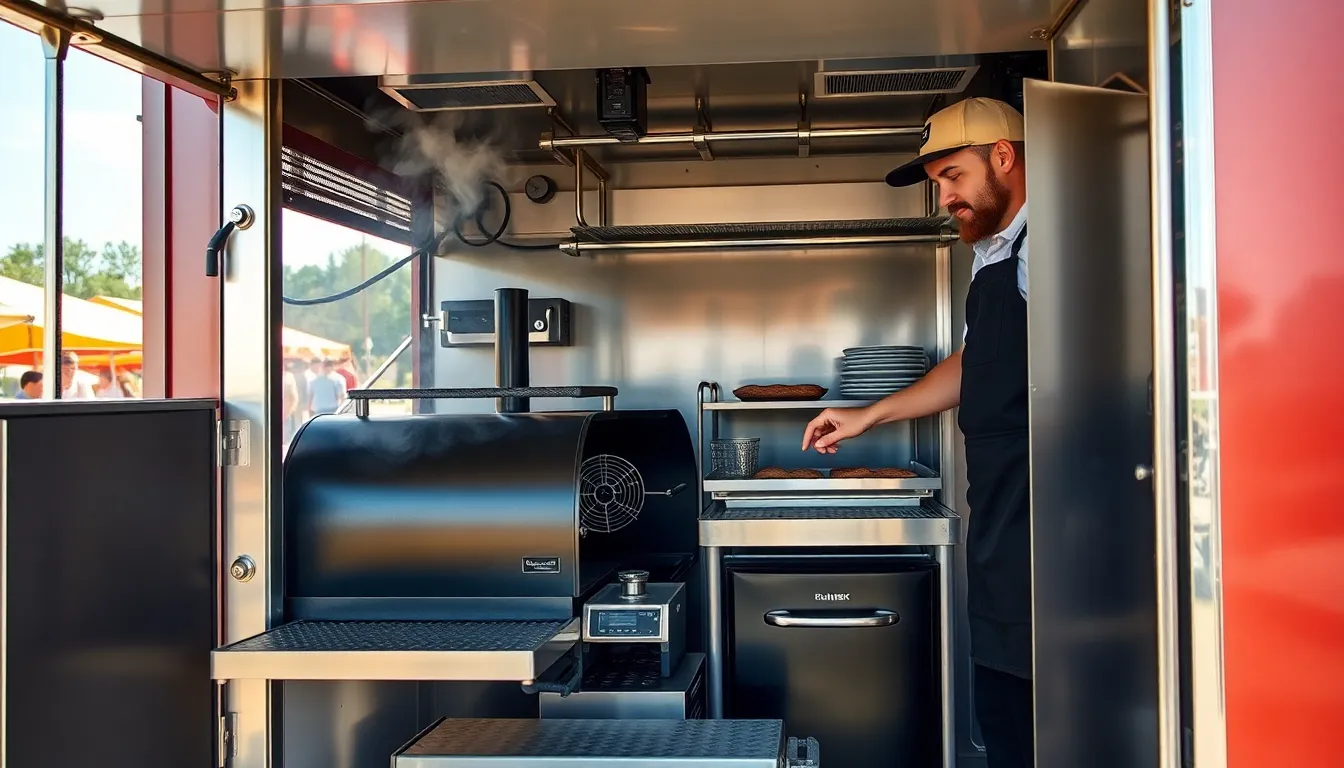
Setting up your BBQ trailer with the right equipment determines whether you’ll serve mediocre meals or create memorable dining experiences. We’ll guide you through the critical components that transform an empty trailer into a profitable mobile BBQ operation.
Smoker and Grill Configuration Options
Smokers form the heart of any authentic BBQ operation, providing the slow cooking capabilities needed for tender brisket, pulled pork, and fall-off-the-bone ribs. We recommend selecting compact, efficient models that maximize your workspace without sacrificing cooking capacity. Wood and charcoal smokers deliver the authentic BBQ flavors customers crave, while pellet smokers offer precise temperature control for consistent results.
Grills complement your smoking capabilities by handling direct high-heat cooking for burgers, steaks, and quick-service items. Combination units that incorporate both smoking and grilling functions help optimize limited trailer space. Equipment selection depends entirely on your menu needs and available square footage.
Versatile cooking setups might include fryers or ovens depending on your planned offerings. Consider modular equipment that can adapt to different cooking styles throughout the day.
Ventilation and Fire Safety Systems
Proper ventilation systems are absolutely critical in BBQ trailers due to heavy smoke and grease production that occurs during cooking operations. These systems must efficiently remove smoke, grease-laden vapors, and odors to maintain safe air quality for both staff and customers. Upblast exhaust fans with high-efficiency grease filters work best for grills and fryers in mobile food service.
Ventilation installations must comply with NFPA 96 regulations, requiring quarterly inspections and routine cleaning by certified specialists. Buildup prevention is essential since accumulated grease can cause dangerous fires that destroy equipment and threaten lives.
Fire suppression systems are mandatory in most jurisdictions and come in two main types: wet chemical and dry chemical systems. Both are designed to quickly extinguish grease fires before they spread throughout your trailer. Fire inspectors will assess your ventilation, suppression equipment, and cooking areas for compliance before issuing permits.
Regular maintenance keeps these safety systems functioning properly and protects your investment in equipment and business operations.
Food Storage and Refrigeration Answers
Reliable refrigeration keeps raw meats, sauces, and perishables safe while maintaining the quality customers expect from your BBQ offerings. Mobile trailers require compact but capacity-efficient units that fit your space constraints without compromising food safety standards.
Under-counter refrigerators maximize floor space while providing easy access to frequently used ingredients during busy service periods. Insulated storage compartments help maintain consistent temperatures even when you’re traveling between locations or during extended service hours.
Temperature control prevents foodborne illnesses and maintains ingredient freshness throughout your operating day. We recommend investing in units with digital temperature monitoring to ensure compliance with health department requirements.
Proper refrigeration planning includes separate storage for raw meats, prepared foods, and beverages to prevent cross-contamination and optimize workflow efficiency.
Creative BBQ Trailer Design Ideas to Attract Customers
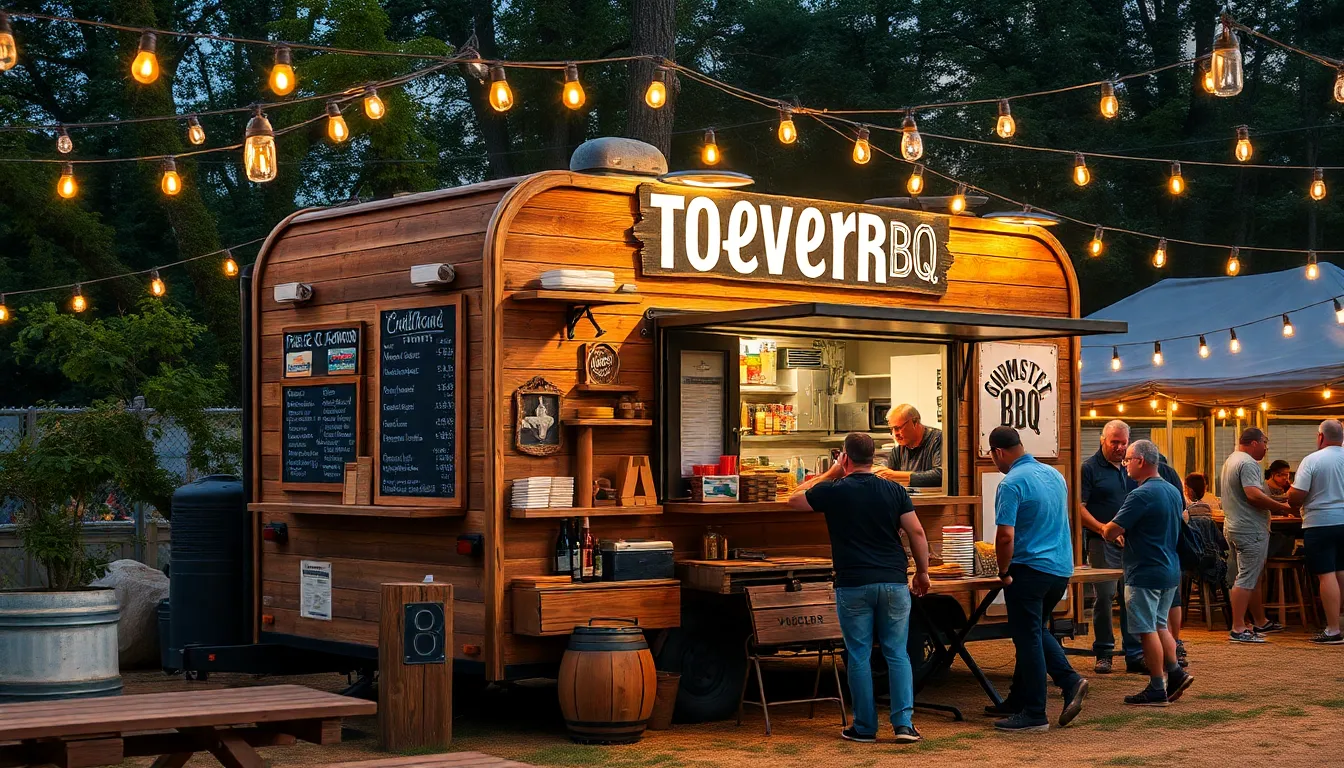
Visual appeal drives customer attraction more than any other factor in the mobile food industry. Smart design choices transform ordinary trailers into memorable dining destinations that stand out in crowded markets.
Rustic Country Theme with Wood Accents
Natural wood finishes create an authentic BBQ atmosphere that resonates with customers seeking traditional homestyle experiences. Reclaimed wood counters paired with warm earthy tones evoke nostalgia while establishing credibility for your BBQ create. Wood paneling throughout the service area adds texture and warmth that competitors’ sterile setups can’t match.
Mason jar lights provide functional illumination while reinforcing the country aesthetic. Chalkboard menus mounted on rustic frames give you flexibility to update daily specials while maintaining the handcrafted feel. Vintage signage and weathered metal fixtures complete the look without overwhelming the space.
This theme pairs perfectly with Texas and Carolina BBQ styles because it emphasizes tradition and authenticity. Customers immediately understand they’re getting genuine pit-smoked meats when the trailer’s appearance matches the cooking method’s heritage.
Modern Industrial Style with Metal Finishes
Sleek stainless steel surfaces create a contemporary urban vibe that attracts younger demographics and trend-conscious customers. Black metallic paint schemes combined with exposed bolts and steel framing project durability and professionalism. This design approach works exceptionally well for gourmet BBQ concepts that blend traditional techniques with modern presentations.
LED light strips provide bright task lighting while creating an edgy aesthetic that photographs well for social media marketing. Minimalist graphics ensure your brand message stays clear without visual clutter. Bold geometric patterns on service windows can serve as Instagram-worthy backdrops for customer photos.
Industrial designs offer practical advantages beyond aesthetics. Stainless steel surfaces resist stains and clean easily during high-volume service periods. Metal fixtures withstand daily wear better than decorative alternatives, reducing maintenance costs over time.
Regional BBQ Style Branding Elements
Regional BBQ branding establishes instant credibility by connecting your trailer to established culinary traditions. Kansas City themes featuring bold reds and blues communicate the region’s sauce-heavy approach. Memphis designs incorporating blues music imagery tell customers they’ll experience authentic dry rub traditions.
Custom logos incorporating regional maps or landmarks create conversation starters that engage customers before they even order. Color schemes matching your chosen region’s cultural identity help customers immediately understand your BBQ philosophy. Texas themes using lone star imagery and western fonts signal customers should expect bold, beef-focused menus.
Local artwork featuring BBQ pioneers or historical smoking techniques adds educational value to the dining experience. Menu boards displaying regional spice blends and sauce varieties reinforce authenticity while justifying premium pricing. This approach works because customers pay more for experiences they perceive as genuine and rooted in tradition.
Legal Requirements and Permits for BBQ Food Truck Operations
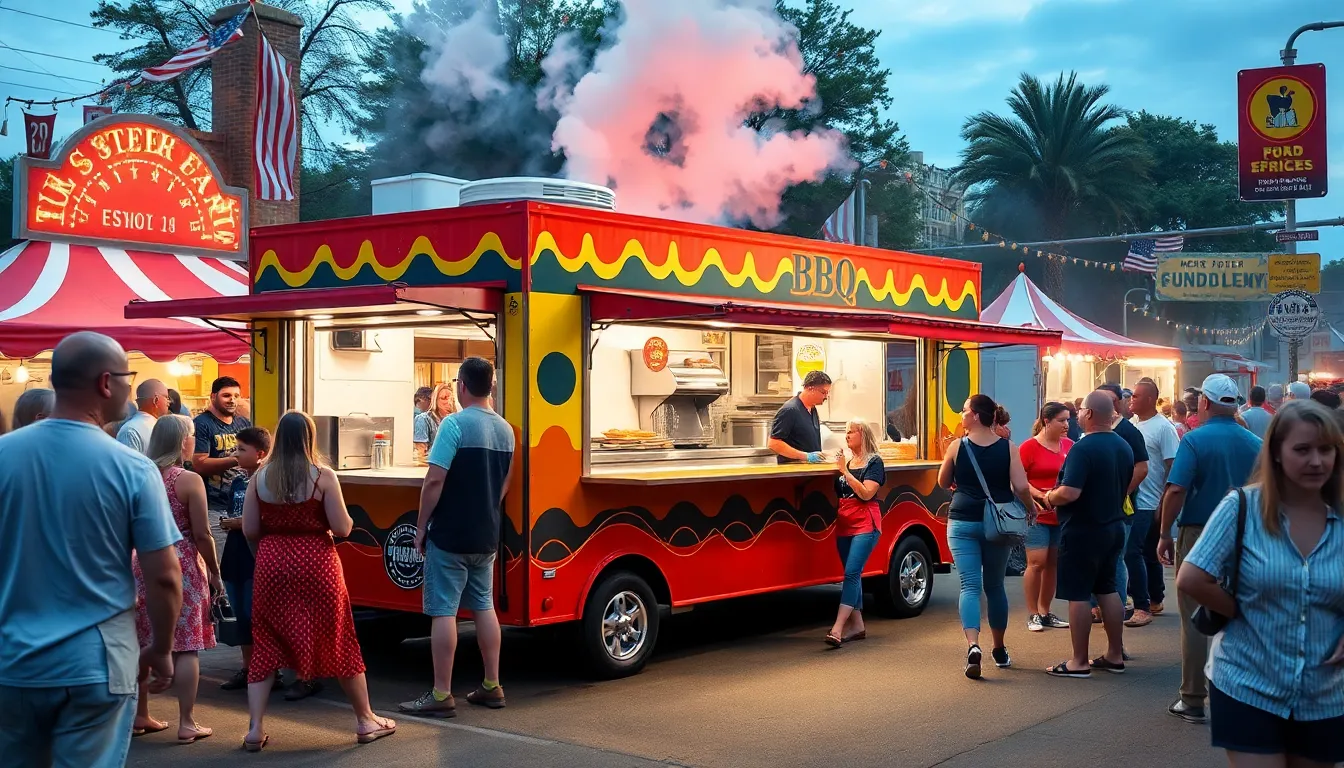
Launching your BBQ trailer business requires handling a complex web of legal requirements that vary by jurisdiction. We’ll break down the essential permits and compliance standards you need to operate legally and protect your investment.
Health Department Compliance Standards
Temperature control systems must maintain perishable food items within safe ranges throughout your entire operation. Your trailer needs running water available for cleaning equipment, hands, and surfaces to meet basic sanitation requirements.
Regular health inspections verify cleanliness and food safety practices, with inspectors conducting “turned on” inspections where all systems operate in real time. Staff members require certified food manager credentials and food handler cards to demonstrate proper food safety knowledge.
Waste disposal regulations prevent contamination and require approved methods for disposing of grease, food scraps, and wastewater. Failing these inspections results in fines or forced closure, making ongoing compliance critical for business continuity.
Business License and Registration Needs
Business registration with your state’s Secretary of State establishes your legal entity and allows you to operate commercially. You’ll need an Employer Identification Number (EIN) from the IRS for tax purposes and payroll management.
Vehicle registration with the Department of Motor Vehicles ensures your trailer meets transportation safety standards. Local permits may include mobile vendor permits, commissary agreements for approved food preparation facilities, and fire certificates after equipment inspection.
Zoning compliance affects where you can park and operate, with some areas restricting food truck activities during certain hours or days. Additional permits might include seller’s permits for sales tax collection and specialized permits for propane equipment usage.
Insurance and Liability Coverage Options
| Insurance Type | Coverage | Importance Level |
|---|---|---|
| General Liability | Bodily injury and property damage claims | Essential |
| Commercial Auto | Vehicle damage and accidents | Required |
| Product Liability | Foodborne illness and allergic reactions | Critical |
| Workers’ Compensation | Employee injury protection | Mandatory with staff |
| Property Insurance | Equipment and inventory protection | Recommended |
General liability insurance protects against customer injury claims and property damage incidents that commonly occur in food service operations. Commercial auto insurance covers your trailer during transport and while parked at serving locations.
Product liability coverage becomes crucial when serving food, as it protects against claims related to foodborne illnesses or allergic reactions from your BBQ offerings. Workers’ compensation insurance is mandatory if you employ staff and covers medical expenses for work related injuries.
Property insurance safeguards your expensive smokers, refrigeration units, and cooking equipment against theft or damage from weather events. Choosing appropriate coverage levels helps mitigate the important risks involved in mobile food operations while ensuring compliance with local regulatory requirements.
Menu Planning Strategies for BBQ Trailer Success
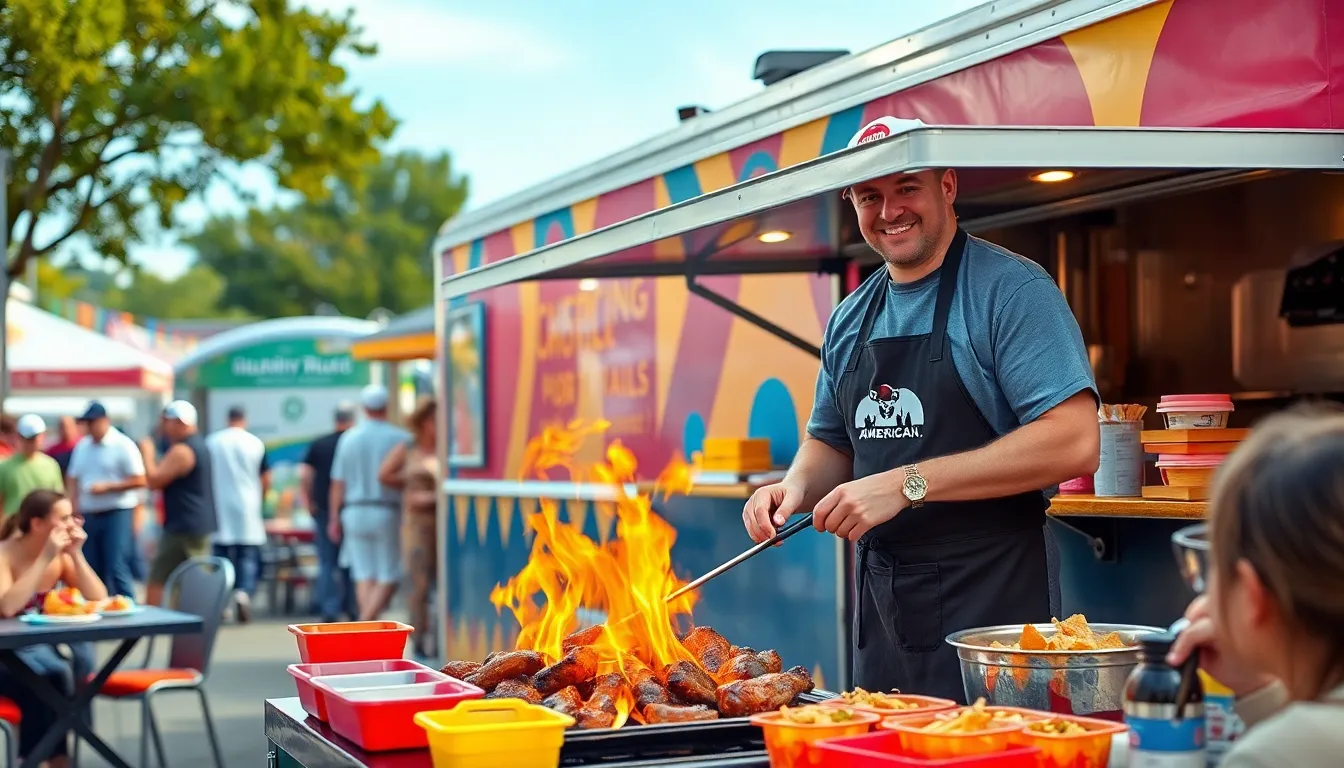
Successful BBQ trailers require strategic menu planning that balances customer appeal with operational efficiency. We’ve found that focusing on signature dishes, prep-ahead items, and smart pricing creates the foundation for a profitable mobile BBQ business.
Signature Dishes That Travel Well
Develop signature BBQ items that showcase your unique culinary style and create lasting brand identity. These standout dishes attract loyal customers and differentiate your trailer from competitors in the crowded mobile food market.
Design portable menu items that maintain quality during transport and service. BBQ sandwiches topped with your signature slaw work perfectly for customers eating on the go. Wrapped ribs stay warm longer and prevent messy spills. Slider combinations allow customers to sample multiple flavors without commitment.
Focus on dishes that can be consistently executed within your trailer’s kitchen space. Limited cooking area means signature items must work with your equipment setup. Pulled pork sliders require minimal assembly time during rush periods. Smoked chicken wraps use pre-cooked proteins that reheat quickly.
Create menu items that hold their flavor and texture when kept warm. Brisket burnt ends maintain their crispy exterior in warming trays. Sauce-glazed ribs stay moist without becoming soggy. These qualities ensure customer satisfaction even during busy service periods.
Prep-Ahead Items for Efficiency
Prepare sauces, rubs, and marinades in advance to streamline your cooking process. Batch-made BBQ sauces can be portioned and stored for weeks. Custom spice rubs mixed ahead of time ensure consistent flavor profiles. Marinated proteins develop deeper flavors when prepared the night before service.
Pre-cook slow-smoked meats to reduce customer wait times without sacrificing flavor. Brisket and pulled pork can be fully cooked, then reheated to serving temperature during service. This approach cuts wait times from hours to minutes while maintaining authentic BBQ taste.
Batch-prepare sides and accompaniments that complement your main dishes. Coleslaw stays fresh for days when properly stored. Baked beans can be made in large quantities and reheated as needed. Potato salad portions well and requires no last-minute preparation.
Pre-portion items during slower periods to speed up assembly during peak hours. Individual sauce cups save time during the lunch rush. Pre-cut vegetables for sides eliminate prep work during service. Portioned meat portions ensure consistent serving sizes and faster plating.
Pricing Strategies for Mobile Food Service
Set prices that reflect ingredient costs, preparation time, and local market demand. Research competitors’ pricing to position your offerings competitively within the food truck scene. Factor in the premium customers pay for convenience and unique flavors when determining your price points.
Offer combo meals and daily specials to increase average ticket size. Meat and two sides combinations provide perceived value while boosting profits. Weekly specials featuring seasonal ingredients keep customers returning to try new offerings. Bundle pricing encourages customers to purchase more items per visit.
Balance affordability with profitability to attract repeat customers. Price items so they’re accessible to your target market while maintaining healthy margins. Quality ingredients and expert preparation justify premium pricing over fast-food alternatives. Consistent value builds customer loyalty in the competitive mobile food market.
Carry out seasonal pricing strategies to manage costs and maximize profits. Adjust menu prices based on ingredient availability and demand fluctuations. Summer pricing can reflect higher event volumes and increased foot traffic. Off-season pricing adjustments help maintain customer base during slower periods.
Strategic Location Selection for BBQ Food Truck Positioning
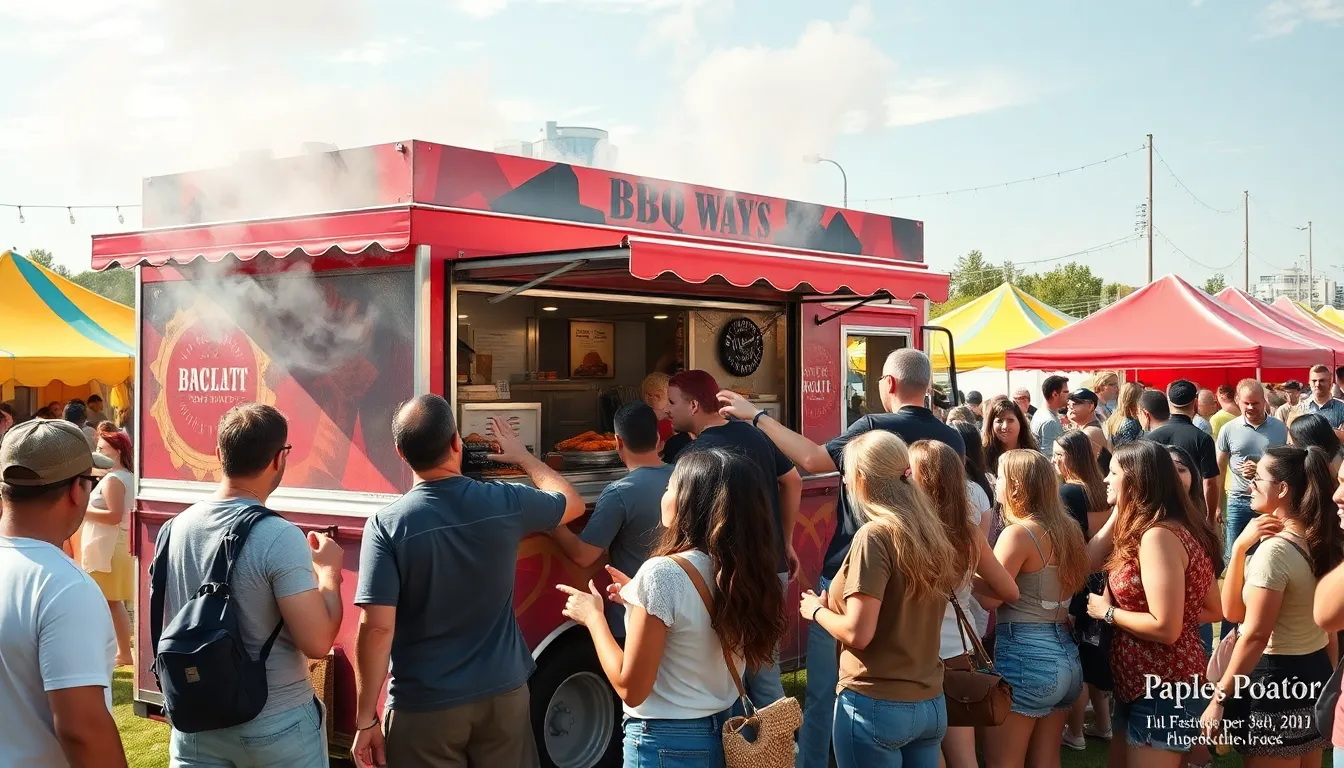
Smart location choices directly impact your BBQ trailer’s profitability and customer base. We’ve identified three proven positioning strategies that consistently deliver strong sales results for mobile BBQ operations.
High-Traffic Event Venues
Events like festivals, fairs, markets, and concerts create captive audiences eager for quality BBQ cuisine. We recommend targeting these venues because they offer limited food competition while drawing diverse customer bases who expect specialty dining options. Participating as a vendor exposes your BBQ trailer to thousands of potential customers during peak attendance days.
Festival environments work exceptionally well for BBQ trailers since attendees typically spend several hours at events and seek authentic, filling meals. Concert venues provide similar opportunities with hungry crowds looking for convenient food options between performances. Fair participation allows you to showcase your signature BBQ items to families and groups who often share large portions.
Vendor applications for major events typically require advance planning and may involve competitive selection processes. We suggest building relationships with event organizers by starting with smaller local gatherings before applying for larger festivals.
Business District Lunch Spots
Office complexes, business parks, and downtown areas with concentrated working populations generate consistent weekday lunch traffic. Positioning your BBQ trailer near these locations targets young professionals and office workers seeking quick, flavorful meals during limited lunch breaks. Business district customers often become repeat customers when you provide reliable service and quality food.
Areas with minimal food truck competition enhance your BBQ trailer’s appeal and reduce price pressure from competitors. Downtown locations typically offer higher foot traffic but require careful navigation of local permits and parking regulations. Business park positioning may provide more stable parking arrangements with less regulatory complexity.
We recommend scouting potential business district locations during lunch hours to assess foot traffic patterns and existing food options. Establishing relationships with nearby office building managers can help secure preferred parking spots and build awareness among tenant companies.
Weekend Festival and Market Opportunities
Farmers markets, weekend street fairs, and outdoor markets present excellent opportunities for weekend BBQ sales when traditional lunch crowds aren’t available. These settings attract customers interested in artisanal and hearty meals who appreciate the create and quality associated with authentic BBQ preparation.
Weekend markets often feature local produce and handmade goods, creating an atmosphere that complements BBQ’s artisanal appeal. Rotating between popular weekend market locations helps you discover key customer demographics while broadening your overall reach. Market customers frequently seek substantial meals that justify their outing, making BBQ an ideal fit for these venues.
Farmers market participation requires understanding each market’s customer base and timing your menu offerings accordingly. Morning markets may favor breakfast BBQ items, while afternoon markets work better for traditional lunch and dinner portions. We suggest testing different weekend venues to identify which locations generate the strongest sales for your exact BBQ offerings.
Budget-Friendly BBQ Trailer Startup Ideas
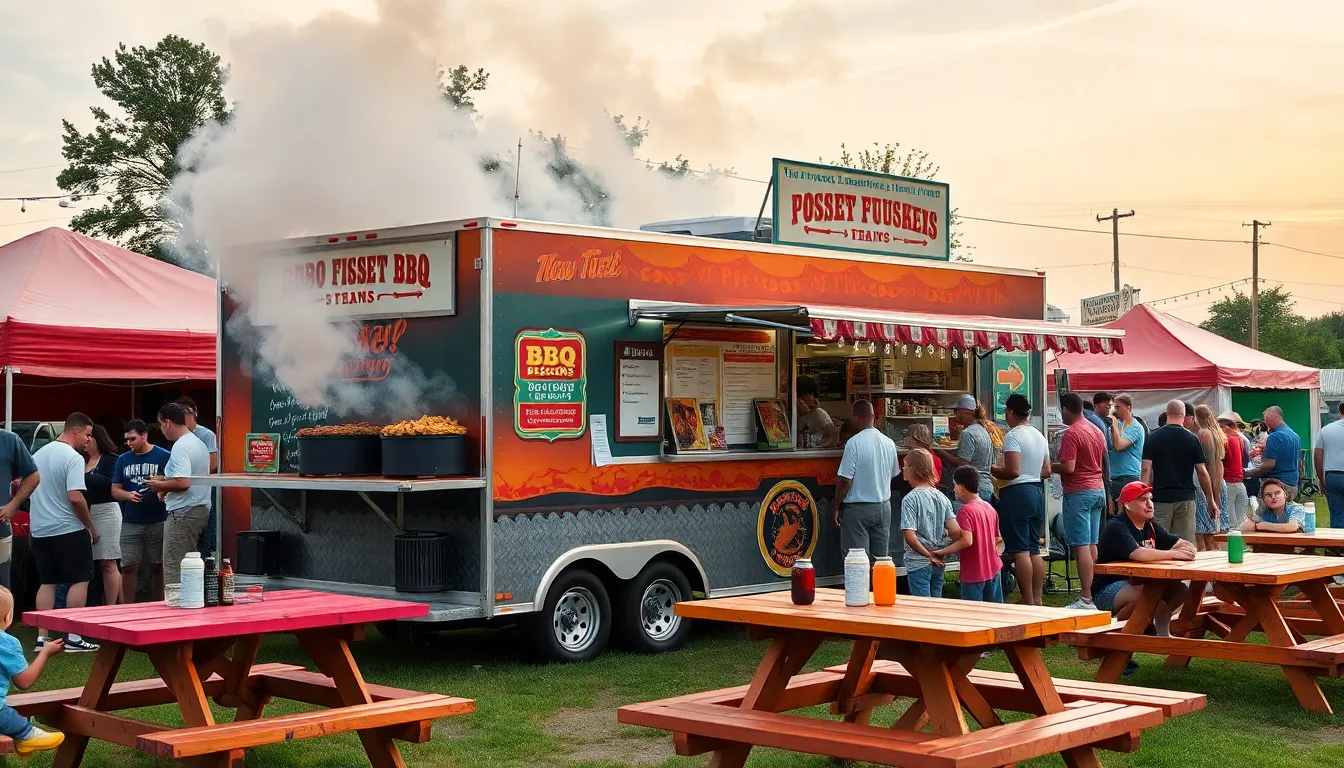
Starting your BBQ trailer business doesn’t require a massive investment when you focus on smart, cost-effective strategies. We’ll explore practical approaches that keep your startup costs manageable while building a profitable mobile BBQ operation.
Used Trailer Conversion Options
Cargo trailers offer the most affordable foundation for BBQ trailer conversions, typically costing 40-60% less than purpose-built food trailers. We recommend starting with 6×12 or 5.5’x9.5′ cargo trailers that provide sufficient cooking and serving space without overwhelming initial expenses.
Vintage campers present another excellent conversion opportunity with their existing electrical systems and water connections already in place. These retro trailers often require less structural modification while delivering authentic charm that attracts customers.
Concession windows transform any trailer into a customer-friendly serving space with professional installation costs ranging from $800-1,500 per window. Adding fold-out awnings creates weather protection and expands your service area during peak hours.
Reinforcement work ensures your converted trailer handles the demands of daily food service operations. Wall strengthening supports equipment weight and frequent use while meeting health department structural requirements.
DIY Equipment Installation Tips
Three-compartment sinks represent your most critical DIY installation since health departments require proper washing, rinsing, and sanitizing stations for permit approval. We suggest purchasing complete sink kits with installation guides to ensure compliance.
Water pumps and heaters connect easily using standard plumbing parts available at hardware stores, saving hundreds in professional installation fees. Online tutorials walk you through each step while supplier kits include necessary fittings and connections.
Ventilation fans remove smoke efficiently when positioned correctly above cooking areas and connected to exterior vents. Installing these systems yourself using manufacturer instructions keeps costs under $500 compared to $1,200 professional installations.
Interior lighting and flooring upgrades create professional appearances using affordable materials from Amazon or local suppliers. LED strip lights provide bright, energy-efficient illumination while vinyl flooring meets health code requirements.
Cost-Effective Marketing Approaches
Social media platforms showcase your trailer design and menu items without traditional advertising expenses, reaching thousands of potential customers through strategic posting and engagement. We recommend focusing on Instagram and Facebook for maximum BBQ food truck visibility.
Local fairs and festivals generate immediate revenue while building brand recognition in your community. Participation fees typically range from $50-200 per event, delivering excellent returns when you serve quality BBQ to hungry crowds.
Loyalty programs encourage repeat customers through simple punch cards or mobile apps that track purchases and reward frequent visitors. These programs cost virtually nothing to carry out but significantly increase customer lifetime value.
Cross-promotion partnerships with nearby businesses expand your reach through shared customer bases and collaborative marketing efforts. Event venues, breweries, and retail stores often welcome food truck partnerships that benefit both businesses.
Advanced BBQ Trailer Features for Competitive Advantage
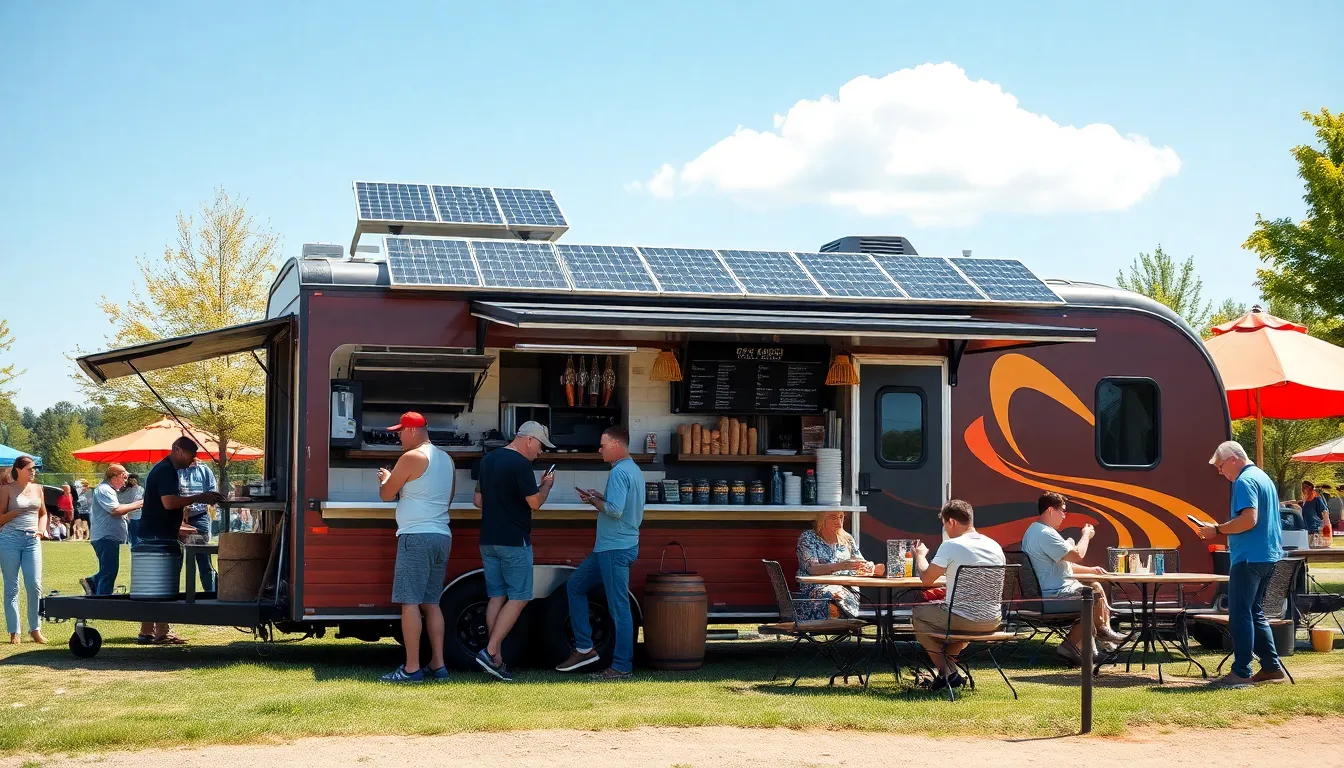
Modern BBQ trailers need cutting-edge features to stand out in today’s competitive mobile food market. We’re exploring three game-changing technologies that’ll boost your efficiency and profitability.
Solar Power and Generator Systems
Sustainable energy answers transform BBQ trailers into eco-friendly powerhouses that reduce operating costs significantly. Photovoltaic panels mounted on trailer roofs convert solar energy into electricity for onboard appliances and equipment. Standard setups include 220W to 400W solar panels paired with portable generators like the EcoFlow DELTA 2 for reliable power generation.
Expandable power systems accommodate growing energy demands through additional panels or upgraded models like the DELTA Pro. Food trucks typically require 4,000 to 7,000 watts of power capacity to operate efficiently throughout service hours. Backup dual-fuel smart generators running on propane ensure continuous power supply during low solar output periods.
Environmental benefits eliminate emissions and noise pollution while customers enjoy their meals in comfort. Solar technology reduces dependency on fossil fuels and significantly cuts fuel costs over time. Clean energy operations create a pleasant dining atmosphere without unpleasant odors or disruptive generator sounds.
Point-of-Sale Technology Integration
Modern POS systems streamline transactions and revolutionize inventory management for BBQ trailers. Advanced technology supports contactless payments, tracks real-time sales data, and manages inventory automatically. Quick payment processing reduces wait times and improves order accuracy for enhanced customer satisfaction.
Integrated platforms connect mobile ordering apps with inventory tracking and sales analytics. Real-time data helps optimize menu offerings based on customer preferences and ingredient availability. Digital receipts and loyalty program integration boost customer retention and repeat business opportunities.
Operational efficiency increases through automated reporting and simplified accounting processes. Staff training becomes easier with intuitive interfaces that reduce human error during busy service periods. Cloud-based systems provide access to business data from anywhere for better decision making.
Customer Ordering and Pickup Systems
Mobile ordering platforms enable customers to place orders ahead of time through dedicated apps and QR code menus. Seamless integration with POS systems provides real-time order updates and efficient queue management. Pre-ordering reduces crowding around the trailer and improves overall service flow.
Pickup optimization includes designated collection areas and pickup lockers for contactless service options. Strategic placement of pickup zones minimizes congestion while maintaining social distancing protocols. Clear signage and order numbering systems help customers locate their orders quickly and efficiently.
Digital communication keeps customers informed about order status through automated text notifications and app alerts. Real-time tracking allows customers to plan their arrival perfectly and reduces perceived wait times. Feedback collection through digital platforms helps identify improvement opportunities and maintains service quality standards.
Maintenance and Cleaning Protocols for BBQ Food Trucks
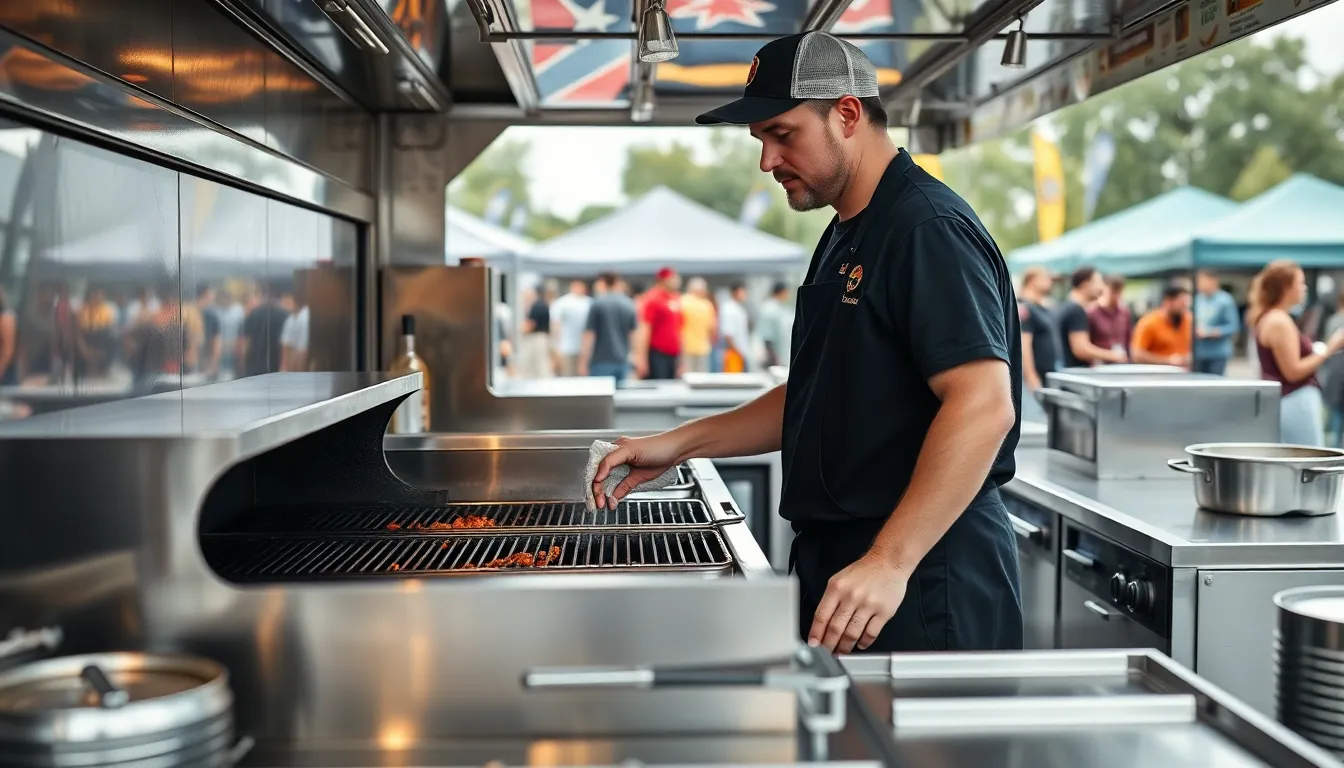
Building on your BBQ trailer’s advanced features and operational strategies, we must establish rigorous maintenance protocols to ensure food safety compliance and equipment longevity. These systematic cleaning procedures protect your investment while maintaining the high standards customers expect from your mobile BBQ operation.
Daily Equipment Sanitization Routines
Sanitize all cooking surfaces with food-safe disinfectants after each service to prevent bacterial growth and food residue buildup. We recommend wiping down grills, stovetops, and service windows immediately following use to maintain optimal hygiene standards.
Wash cooking utensils and dishware immediately after each shift to avoid contamination risks. Dishes, cookware, and cutting boards require thorough sanitization using approved cleaning agents before storage.
Clean floors thoroughly by sweeping debris and mopping with sanitizing solution to reduce slip hazards and maintain professional appearance standards.
Disassemble complex equipment like blenders and mixers daily for comprehensive cleaning of hidden food particles. This process ensures no residue accumulates in hard-to-reach areas where bacteria can multiply.
Maintain fryer and grill cleanliness according to manufacturer specifications every day to sustain equipment performance and meet health code requirements. Proper daily cleaning extends equipment life and ensures consistent cooking results.
Preventive Maintenance Schedules
Sharpen knives monthly and replace damaged tools to maintain operational efficiency and reduce food safety risks. Sharp equipment prevents accidents and ensures precise food preparation.
Inspect fire extinguishers monthly to verify they’re functional and current, protecting your investment and meeting safety regulations.
Calibrate cooking equipment monthly to ensure accurate temperatures and regulatory compliance. Ovens and grills require regular calibration for consistent food quality and safety standards.
Clean exhaust systems monthly including hoods, filters, and fans to prevent dangerous grease accumulation and maintain proper ventilation. Regular cleaning prevents fire hazards and ensures efficient smoke removal.
Check drainage systems regularly and clean grease traps as needed to prevent blockages and contamination issues. Professional cleaning services may be necessary for complex drain maintenance.
Deep clean dishwashing areas monthly while checking for limescale buildup that can affect sanitization effectiveness.
Deep Cleaning Between Events
Conduct comprehensive interior cleaning of walls, ceilings, and floors to eliminate accumulated grease and dirt between major events. This thorough approach maintains professional standards and prevents long-term damage.
Deep clean ice machines by removing all ice, sanitizing internal components, and inspecting drain lines to prevent bacterial growth. Clean ice machines ensure safe beverage service and customer satisfaction.
Perform thorough refrigeration cleaning in freezers and coolers to maintain food safety standards during storage periods. Temperature-controlled environments require regular deep cleaning to prevent contamination.
Clean dishwasher components weekly or as usage demands, focusing on food traps and filters that accumulate debris during heavy service periods.
Schedule professional hood cleaning as part of periodic maintenance to ensure effective exhaust ventilation and fire safety compliance. Professional services have specialized equipment for thorough grease removal that exceeds standard cleaning capabilities.
Marketing Your BBQ Trailer Food Truck Business
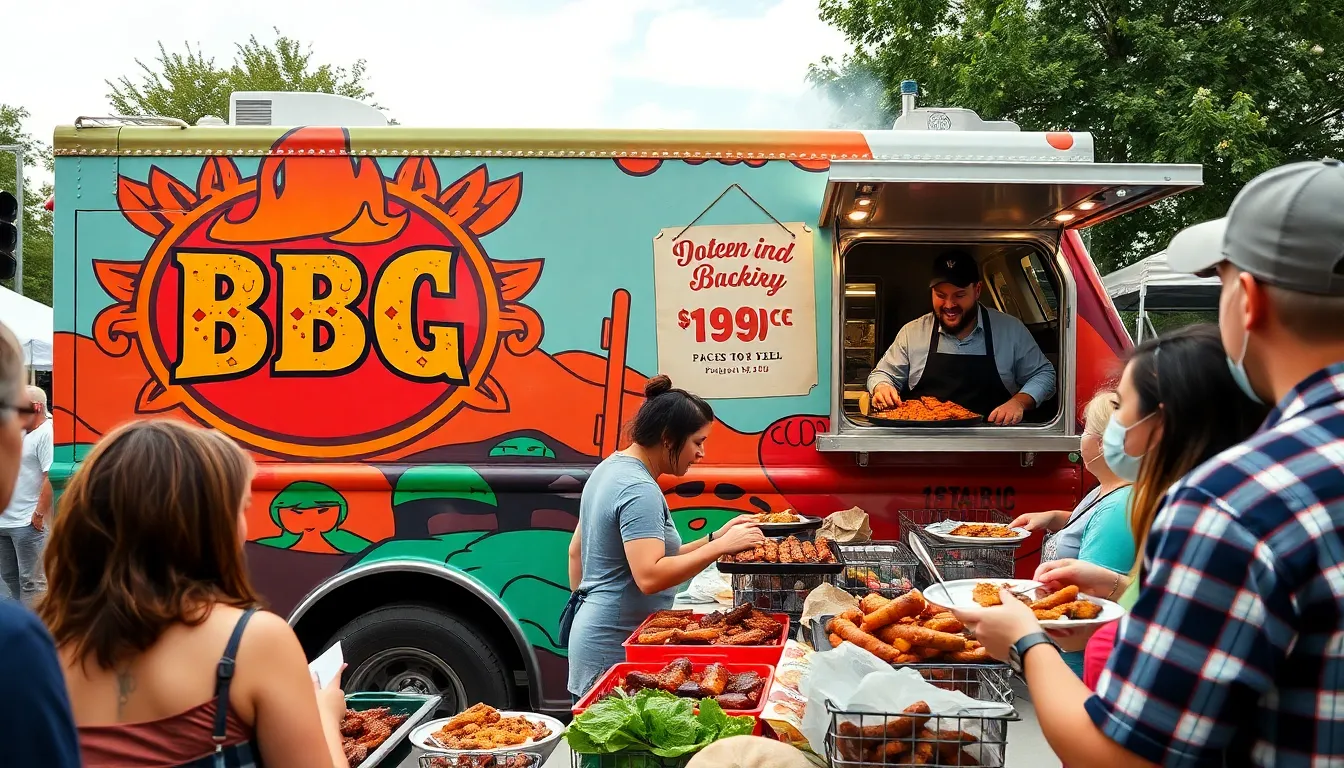
Building a successful BBQ trailer business extends beyond exceptional food and equipment. We need strategic marketing approaches that create lasting connections with our target audience and establish our brand in the competitive mobile food industry.
Social Media Presence Building
Creating a strong brand identity sets our BBQ trailer apart from countless competitors. We should develop a catchy name and memorable logo that reflects our unique BBQ style, paired with a cohesive color scheme that makes our truck instantly recognizable online and in person.
Posting high-quality images of our smoked meats drives customer engagement and hunger. Food photography showcases our signature dishes like brisket platters, pulled pork sandwiches, and ribs, creating visual appeal that converts followers into paying customers.
Interactive campaigns transform passive followers into active community members. We can use polls to let customers vote on tomorrow’s special, create challenges around BBQ trivia, and host contests where followers share photos of their favorite meals for prizes like free combo meals.
Consistent content marketing builds trust and improves our search engine visibility. Behind-the-scenes videos of our smoking process, customer testimonials praising our burnt ends, and how-to guides for BBQ sauce selection create valuable content that positions us as BBQ experts.
Leveraging customer feedback helps us adapt our offerings to local preferences. We should actively respond to comments and suggestions, using social media insights to adjust our menu items, cooking times, and even parking locations based on what our community wants most.
Local Community Engagement Strategies
Choosing strategic locations maximizes our visibility and foot traffic potential. High-traffic areas like weekend farmers markets, summer music festivals, and busy downtown corners during lunch hours provide consistent exposure to hungry customers seeking convenient meal options.
Participating in local events creates authentic connections with our community. County fairs, charity fundraisers, and business district events allow us to showcase our BBQ skills while supporting causes that matter to our neighbors.
Building partnerships with local businesses expands our reach through collaboration. We can work with breweries to provide food for their customers, partner with office complexes for catered lunch events, and team up with event planners who need reliable BBQ catering services.
Creating a food truck community encourages customers to become brand advocates. We should foster relationships that extend beyond transactions, encouraging loyal customers to share their experiences and recommend our trailer to friends, family, and coworkers.
Customer Loyalty Program Development
Loyalty points and rewards programs encourage repeat visits without important cost investment. Customers earn points for each purchase, with every tenth meal free or discounts on combo platters, creating incentives that increase our average customer lifetime value.
Customer of the month recognition builds personal connections through social media spotlights. We can feature loyal customers on our social platforms, sharing their favorite orders and offering small rewards like free sides or drinks that cost us minimal amounts but create important goodwill.
Handwritten thank-you notes create authentic personal touches that enhance customer loyalty. Small gestures like handwritten messages on takeout bags or personalized recommendations based on previous orders demonstrate that we value each customer as an individual rather than just another transaction.
CRM systems help us manage customer data for personalized marketing approaches. Tracking customer preferences, purchase history, and contact information allows us to send targeted promotions, birthday discounts, and location updates that improve customer service while supporting long-term relationship building.
Conclusion
We’ve covered everything you need to launch a successful BBQ trailer business from creative design concepts to essential maintenance protocols. The mobile BBQ industry offers incredible opportunities for entrepreneurs who combine smart planning with authentic flavors.
Your success depends on three key factors: choosing the right trailer setup for your target market creating memorable customer experiences through quality food and service and maintaining consistent operations through proper equipment care and cleaning protocols.
Remember that every successful BBQ trailer started with a vision and careful execution. Whether you’re converting a compact cargo trailer for urban markets or investing in a larger setup for high-volume events the foundation remains the same – deliver exceptional BBQ that keeps customers coming back.
Start with a solid business plan carry out the strategies we’ve outlined and you’ll be well-positioned to thrive in this exciting industry.
Frequently Asked Questions
What are the advantages of starting a BBQ food truck business?
BBQ food trucks offer significant advantages including lower startup costs compared to traditional restaurants, operational flexibility to move between locations, and the ability to target high-traffic events. They require less overhead, provide opportunities to test different markets, and allow entrepreneurs to build a customer base while maintaining mobility for optimal positioning.
What’s the ideal trailer size for a BBQ food truck?
Compact trailers (8-14 feet) work best for urban markets with high foot traffic, focusing on speed and quick service. Larger trailers (16-24 feet) are ideal for high-volume events and can accommodate multiple smoking chambers. The choice depends on your target market, expected volume, and operational needs.
What essential equipment do I need for a BBQ trailer?
Essential equipment includes compact smokers and grills that maximize workspace, efficient ventilation systems for smoke removal, reliable refrigeration units, food prep stations, handwashing sinks, and fire safety equipment. Temperature control systems and proper storage compartments are also crucial for food safety compliance and operational efficiency.
What permits and licenses do I need to operate a BBQ food truck?
You’ll need health department permits, business registration, commercial vehicle registration, food handler’s licenses, and various local permits. Requirements include compliance with temperature control systems, sanitation standards, waste disposal regulations, and zoning laws. Insurance coverage including general liability, commercial auto, and product liability is also mandatory.
How should I plan my BBQ trailer menu for maximum profitability?
Focus on signature dishes that travel well, such as BBQ sandwiches and wrapped items. Develop prep-ahead items like batch-prepared sauces and pre-cooked meats to reduce service time. Price items based on ingredient costs and local market demand, offering combo meals and daily specials to increase average ticket size.
Where should I position my BBQ food truck for best results?
Target high-traffic event venues like festivals and concerts for maximum exposure. Position in business districts during weekday lunch hours to capture office workers. Weekend markets attract customers seeking artisanal meals. Building relationships with event organizers and scouting strategic locations enhances visibility and sales opportunities.
What are some budget-friendly ways to start a BBQ trailer business?
Use cargo trailers for conversions or vintage campers for unique charm. Install essential equipment yourself, including sinks and basic ventilation systems. Leverage social media for cost-effective marketing, participate in local events for brand recognition, and implement loyalty programs. Cross-promotion partnerships with nearby businesses can expand reach affordably.
How important is regular maintenance for BBQ food trucks?
Regular maintenance is crucial for food safety compliance and equipment longevity. Implement daily sanitization routines for all cooking surfaces and utensils, follow preventive maintenance schedules for equipment, and conduct deep cleaning between events. Proper maintenance protects your investment and ensures consistent customer satisfaction.
